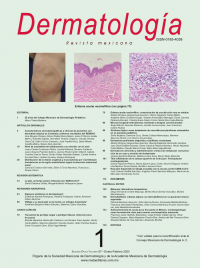Level of adolescent self-esteem and its relationship with acne.
Dermatol Rev Mex. 2023; 67 (1): 18-25. https://doi.org/10.24245/dermatolrevmex.v67i1.8548
Laura Camila Contreras-Patiño,1 Linette Marliece Olivares-Calderón,1 Laura Susana Puentes-Santos,1 Jessica Paola Cañón-Villamil,1 Isabela Carolina García-Torres,1 Duván Felipe Velandia-Siabato,1 Camila Andrea Acosta-Pérez,2 Ledmar Jovanny Vargas-Rodríguez1,2,3
1 Programa de medicina, Universidad de Boyacá, Tunja, Colombia.
2 Oficina de investigación, Hospital Universitario San Rafael, Tunja, Colombia.
3 Oficina de investigación, Hospital Regional de la Orinoquía, Yopal, Colombia.
Resumen
OBJETIVO: Identificar las repercusiones del acné en el autoestima en la población universitaria de Tunja, Colombia.
MATERIALES Y MÉTODOS: Estudio primario observacional de tipo descriptivo transversal, efectuado entre febrero y marzo de 2021, en el que se evaluaron estudiantes universitarios mayores de 18 años de la ciudad de Tunja, Boyacá, Colombia.
RESULTADOS: La población total incluida en el estudio fue de 159 participantes; las variables más comunes en relación con el acné y autoestima bajo en la población evaluada fueron: mayor predominio en el sexo femenino en un 59% en comparación con los hombres con un 41%; edad inicio del acné entre 12 y 20 años (81%), quienes tenían afectación en dos sitios (15.4%), además de cicatrices (59%) y algún sentimiento de rechazo (41%).
CONCLUSIONES: Se identificó la relación entre el acné y el nivel de autoestima, en donde el análisis por sexo mostró que la mayoría de las mujeres con acné eran más susceptibles de tener baja autoestima; la edad de inicio del acné fue entre 12 y 20 años de edad, por ello, el efecto psicosocial del acné vulgar debe valorarse en el manejo de los pacientes con esta afección.
PALABRAS CLAVE: Acné; autoestima; calidad de vida; adolescente; salud mental.
Abstract
OBJECTIVE: To identify the repercussions of acne on self-esteem in the university population of Tunja.
MATERIALS AND METHODS: Primary observational descriptive cross-sectional study, performed from February to March, 2021, in which university students over 18 years of age from the city of Tunja, Boyaca, Colombia, were included.
RESULTS: The total population included in the study was 159 participants; the most common variables related to acne and low self-esteem in the evaluated population were: a greater predominance of the female gender with 59% compared to men with 41%, initial age of acne between 12-20 years (81%), who presented involvement in two parts (15.4 %), in addition to scars (59%) and some feeling of rejection (41%).
CONCLUSIONS: The relationship between acne and the level of self-esteem was identified; analysis by gender showed that most women with acne were more susceptible to present low self-esteem, with the age at onset of acne being between 12 and 20 years. The psychosocial impact of acne vulgaris should be assessed in the management of patients with this disease.
KEYWORDS: Acne; Self-concept; Quality of life; Adolescent; Mental health.
Recibido: mayo 2022
Aceptado: septiembre 2022
Este artículo debe citarse como: Contreras-Patiño LC, Olivares-Calderón LM, Puentes-Santos LS, Cañón-Villamil JP, García-Torres IC, Velandia-Siabato DF, Acosta-Pérez CA, Vargas-Rodríguez LJ. Nivel de autoestima del adolescente y su relación con el acné. Dermatol Rev Mex 2023; 67 (1): 18-25.

